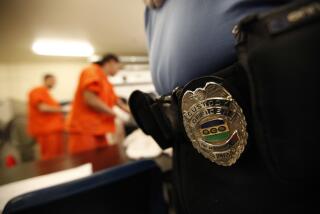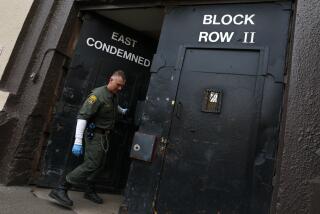Edwards Looking Out for No. 2?
John Edwards’ schedule looks a lot like the travels of a man chasing higher office, with stops in political battlegrounds such as Ohio, Minnesota and, soon, Florida.
But Edwards, who finished second to John F. Kerry in the race for the Democratic presidential nomination, is still the senior U.S. senator from North Carolina -- for a few more months, anyway.
And so a recent clammy Washington afternoon found him back on Capitol Hill, in the Hart Senate Office Building, presiding over “Tar Heel Thursday,” a once-a-week chance for visitors from back home to ask questions of Edwards, grab a handshake or pose for a picture.
The senator arrived late -- tanned and grinning -- and answered 16 questions in 21 minutes, on subjects such as global warming, faith-based health clinics and his unsuccessful bid for president. When asked how his Senate successor would have been chosen had he won the Democratic nomination and resigned his seat, Edwards ruefully admitted, “It’s not a problem now.” He got a big laugh by wishing it was.
No one asked Edwards about the vice presidency. No one had to. No one doubts Edwards would leap at the chance to be Kerry’s running mate, if offered.
But saying so publicly would be a flagrant breach of political protocol, so Edwards elides the question when he is asked, offering a stock answer that even he calls a “nonanswer.”
I respect Sen. Kerry’s decision-making process and know he’ll make a good decision on his timetable, Edwards tells reporters in Columbus, Ohio; Duluth, Minn.; Denver; and other legs of what Republicans tauntingly call his “Please-Pick-Me-For-V.P.-Tour.” (Aides point out that Edwards often travels as a surrogate speaker at the request of the Kerry campaign.)
Edwards, who declined to be interviewed for this article, is not the only one shrouding his desire in bland statements of indifference. Other prospective vice presidential candidates -- including Florida Sens. Bob Graham and Bill Nelson and New Mexico Gov. Bill Richardson -- have appeared on conference calls attacking Bush, or alongside Kerry at campaign stops, all the while disavowing any interest in the No. 2 spot.
At least three have advanced beyond the preliminary stage to be formally vetted by Kerry campaign lawyers: Edwards, Rep. Dick Gephardt of Missouri and Gov. Tom Vilsack of Iowa.
Campaign insiders suggest Kerry will wait until closer to the Democratic National Convention, which starts July 26, before revealing his selection. For now, the Massachusetts senator is keeping his thoughts about a running mate very much to himself and a handful of advisors.
Among those frequently mentioned in the rounds of political gossip, no vice presidential prospect enjoys the abundance of goodwill and grass-roots enthusiasm that Edwards garnered during his White House bid.
Waging a determinedly upbeat campaign, Edwards finished a surprise second in Iowa and won South Carolina, after devoting his greatest effort to those two states. Indeed, the more time he spent in a place, the better voters seemed to like the youthful and gregarious former trial attorney. But the rapid-fire primary calendar left little time for such one-on-one campaigning after Iowa, and Edwards ended his candidacy in early March after a series of runner-up finishes behind Kerry.
“The Edwards buzz is still out there,” said Art Torres, chairman of the California Democratic Party. “Charisma” is one of the words he constantly hears from the faithful describing Edwards.
Mike Erlandson, head of the party in Minnesota, said Edwards was mobbed after speaking last month at the state convention.
“It felt like trying to get Elvis Presley through a crowd,” Erlandson said, “with people trying to get a picture, get an autograph or just touch him. He could have signed 3,000 autographs if he’d struck around.”
Edwards has several boosters inside the Kerry camp, including a number of former campaign aides. Sen. Edward M. Kennedy of Massachusetts, who is close to Kerry, is also known to be a fan.
One of Kerry’s top advisors, Bob Shrum, helped Edwards win his Senate seat in 1998 and urged Al Gore to make Edwards his running mate in 2000. Shrum’s counsel to Kerry is unknown; he too declined to be interviewed for this article.
Although Kerry has professed doubts about Edward’s appeal -- once questioning Edwards’ ability to carry even his home state -- aides to both men say there are no hard feelings left from the primaries.
Edwards criticized Kerry for supporting the 1994 North American Free Trade Agreement and also differed with him over the death penalty, which Edwards supports and Kerry favors only in cases of terrorism. But Edwards steered clear of more provocative attacks -- like George H.W. Bush’s famous denunciation of Ronald Reagan’s “voodoo economics” -- that Republicans could use against the Democratic ticket in the fall.
Donna Brazile, who managed Gore’s 2000 campaign, said Kerry’s main consideration should be what it takes to win the 270 electoral college votes needed to capture the White House. “What happened in the primary stays in the primary,” she said.
Supporters of the North Carolina senator say his addition to a Kerry ticket would automatically make Democrats competitive in several Southern states that President Bush is counting on come November. Much of Edwards’ travel over the next month will take him to the South, including stops -- at Kerry’s request -- in Louisiana and Florida.
Ed Turlington, an attorney in Raleigh, N.C., who served as a top strategist for Edwards’ presidential campaign, suggested that North Carolina and several other Southern states would be instantly competitive if Edwards were to run alongside Kerry.
“Millions of people in Southern states would be proud to have someone from their region of the country” on the Democratic ticket, Turlington said. “But even more important is John’s life story, his working-class background.”
Others are more skeptical; even with two Southerners on the ticket, Arkansan Clinton and Tennessean Gore, the South was a struggle. In 2000, Gore was shut out in the region.
With Iraq emerging as a central campaign issue, Edwards’ relative lack of foreign policy and national defense experience could also work against him.
Still, even naysayers believe that Edwards might help boost the Democratic ticket among rural and blue-collar voters, who were attracted during the primaries to his populist message centered on “two Americas,” one for the privileged and another for everyone else.
Edwards continues to deliver a version of that speech around the country, denouncing HMOs, the outsourcing of U.S. jobs overseas and lamenting the millions of Americans stranded in poverty. Grafted onto his remarks now are several sections of praise for Kerry.
“We are going to say ‘no’ to kids going to bed hungry, ‘no’ to kids who don’t have the clothes to keep them warm,” Edwards told Minnesota Democrats, revising his old speech to make Kerry a partner in that vision. “And we’re going to say ‘no’ forever to any American working full time and living in poverty.”
But the role of understudy does not always seem a natural one for Edwards.
Back at Tar Heel Thursday on Capitol Hill, he was asked about his differences with Bush. After ticking off a long list, he stabbed a finger in the air and concluded, “It’s the reason I should be president.”
“Or John Kerry should be president,” he quickly added.
More to Read
Get the L.A. Times Politics newsletter
Deeply reported insights into legislation, politics and policy from Sacramento, Washington and beyond. In your inbox three times per week.
You may occasionally receive promotional content from the Los Angeles Times.







